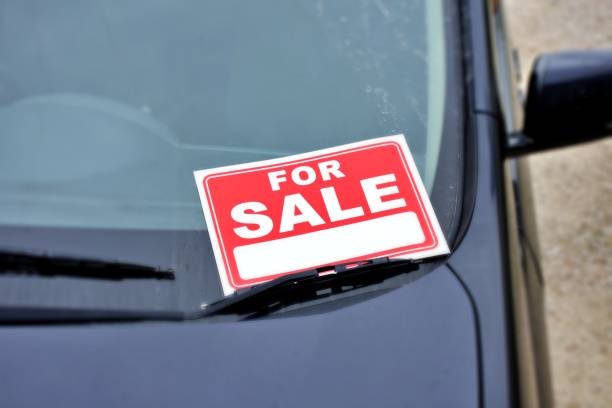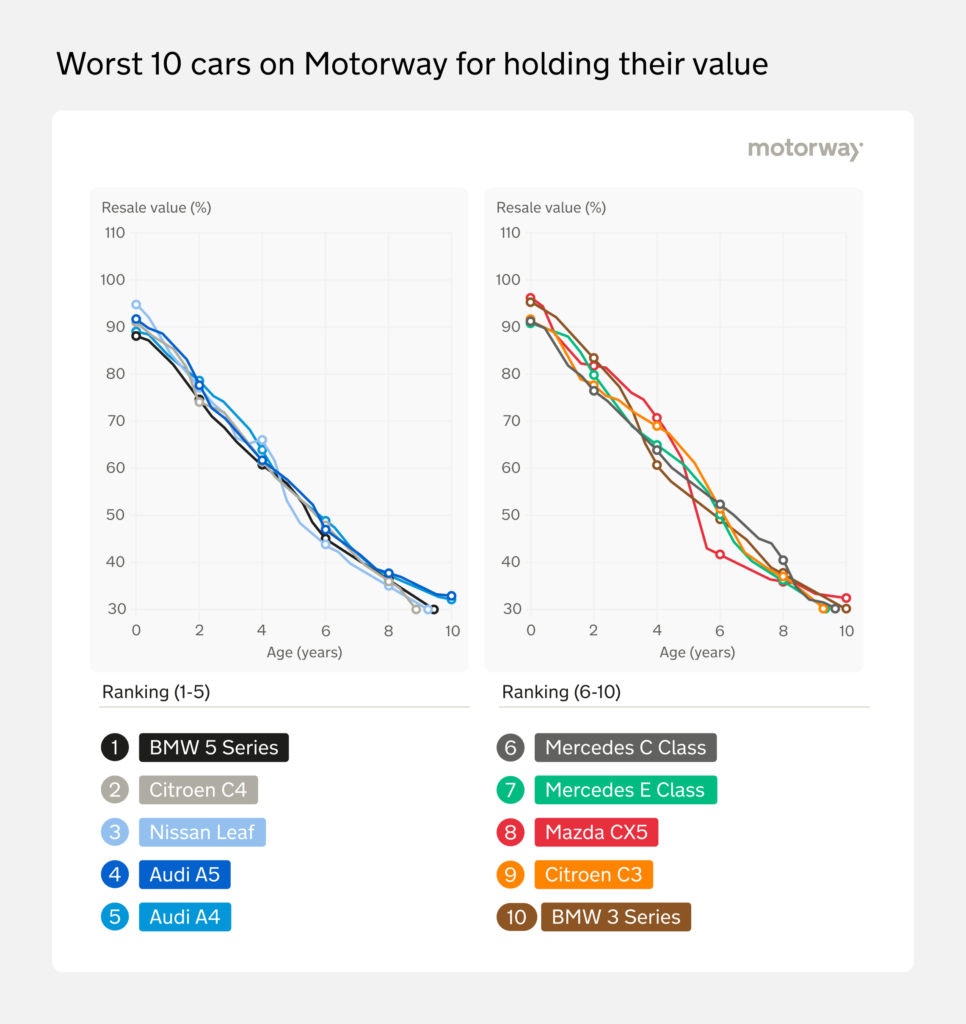The 10 best and worst cars for holding value
For over 9.1 million people in the UK, their car is their biggest financial asset. However, a surprisingly high number of motorists do not track the value of their cars, and assume that car values always decrease at a steady rate.
In reality, car depreciation is a highly variable equation and a rule of averages simply does not apply to most cars.
Buying a new (or new to you) vehicle is an investment that you can rightly assume will lose value over time – but what you can’t assume is the rate at which it might drop, hold, or even (for short periods!) increase.
To find out what your vehicle is worth, get an accurate car valuation using our Car Value Tracker tool.

Read on to find out about the best and worst car models for holding value, based on recent sales data from Motorway.
Why do cars depreciate?
How to track your car’s depreciation
10 best vehicle models for holding value
10 worst vehicle models for holding value
How to avoid car depreciation?

Why do cars depreciate?
Car depreciation describes the rate at which the value of your car decreases over time.
For example, your car might depreciate 30% over the first two years, but then only drop a further 15% over the next two years. The average depreciation rate for these four years is 11% per year, but this doesn’t characterise the dynamics of the changing value.
Every car depreciates at a different rate, creating a different visual shape in their depreciation trends. Therefore, the best time to sell your car and get good value for it is highly variable and hard to predict without seeing reliable valuations at regular intervals.
Age, mileage, and condition are the three most commonly-quoted factors used to appraise a car’s value, before looking at real-time prices being fetched in the used-car market. The typical annual mileage for most UK drivers is around 8,000 miles, and most cars are ready for the scrap heap by 150,000 miles. Condition slips with age thanks to wear and tear as well as accidental damage.
For some cars, external factors such as market conditions can end up having as strong an effect on value than the age/mileage/condition matrix. In fact, in 2021, shortages in new cars meant that many used cars temporarily increased in value – some, quite significantly.
In order to stay on top of your car’s value, and remain aware of how it changes over time, it’s imperative to track the depreciation rate.
How to track your car’s depreciation
Motorway allows you to track the value of up to six-passenger vehicles for free, with the new Car Value Tracker tool. Visualise changes and trends over 24 months, so you stay aware of not just your car’s valuation at any given time, but the rate at which its value is decreasing, holding, or even increasing.
Car Value Tracker uses real-time sales data from Motorway’s marketplace to find out what cars exactly like your one are selling for. By entering your reg and mileage, it identifies similar vehicle sales and compares them to the broader car market.
With all this information available to you, you can choose exactly the right time to sell your vehicle.

10 best vehicle models for increasing in value
Despite used car values having dropped in late 2023, some car models have held their value, or even increased.
Based on Motorway sales data from the past year, the following car models have risen in value over the past year. This data ranks cars ranging from nearly-new to up to five years old based on their average selling price on Motorway in 2023 compared to 2022.

Premium German car manufacturer BMW takes the crown for increasing in value with the BMW I3 electric vehicle. BMW’s first mass-produced, zero emissions vehicle, the subcompact has the durability and high-performance qualities expected from the luxury brand, as well as the added bonus of being an EV. The significant increase in sales price over the past year shows that amid a struggling sector, there is still appetite for eco-friendly vehicles in the UK, especially as emissions and Clean Air Zone policies change.
Toyota and Dacia represent best-in-class for reliability and value, which can explain why they have fetched such good values on Motorway across their ranges. Compared to other leading brands, they are typically affordable to repair and maintain, with aftermarket parts easy swap-ins for damaged components.
Mass-market subcompacts and city cars dominate the top ten. One reason that these smaller vehicles often hold their value well over time is that they almost always represent low mileage for age. Their current owners likely use them for errands opposed to long roadtrips. Buyers are likely looking for cars for the same reasons: for short, local journeys, or even to help teach learners how to drive. When maintained, city cars from trustworthy and affordable brands can hold their value very well compared to larger, more luxury cars.
10 worst vehicle models for holding value
The cars on Motorway that lose the most value the quickest, based on the age range of new to ten years old are:
| Fastest depreciation | Car model | Vehicle class |
| 1 | BMW 5 series | Executive |
| 2 | Peugeot 3008 | SUV |
| 3 | Audi A4 | Compact executive |
| 4 | Audi A5 | Compact executive / sports car |
| 5 | Nissan Leaf | City car |
| 6 | Mercedes C Class | Compact executive |
| 7 | Mercedes E Class | Executive |
| 8 | Mazda CX5 | SUV |
| 9 | BMW 3 Series | Compact executive |
| 10 | Nissan Qashqai | SUV |
Taking position as the tenth fastest depreciating car on Motorway, Nissan Qashqai may come in as a surprise to some. It’s consistently one of the UK’s most popular cars, to buy new or used. This is, in fact, the very reason why the median pricing of the Qashqai shows higher depreciation. When there’s an abundant supply of a popular car model, only those with the best mileage and condition, and most desired add-ons (such as the colour and interior fittings) will rise to the top and achieve the best prices.
The BMW 3 Series, Mercedes C and E Class, and Audi A4 and A5 are in the same boat; there’s plenty of supply. Not only that, but in tricky economic times, buyers are wary of buying prestige cars which can be much more expensive to maintain than cheaper options. Not to mention, that these aspirational models are upgraded and redesigned every few years, leaving the existing car stock on the road downgraded to ‘runout’ status. If Audi has just brought out a new A4 with much more efficiency, and an even more comfortable interior, the value of your existing A4 model can be expected to drop, for example.
Nissan Leaf has been a hugely popular EV since it came out in 2010. In 2020, 2021 and 2022, EVs on the whole did very well. So well, in fact, that other models have overtaken the Leaf and become more popular. Now that Tesla has slashed prices in 2023, we’re seeing a more competitive field for affordable EVs that inspire drivers to invest in these longer-lasting, more sustainable cars.

How to avoid car depreciation?
There’s no real way to affect the benchmarked value that your make and model represents in the automotive market. However, you can control the condition and mileage of your car in order to get the best price within your car’s normal range.
Even if your model typically loses a lot of value, you can present a ‘best in class’ unit by taking good care of it, and the price you fetch will reflect that. For tips in looking after your car to preserve its value, read our ultimate guide.
To start tracking the changing value of your vehicle today, so you can choose the perfect time to sell, value your car with Motorway’s Car Value Tracker.

Ready to sell your car?
Want to read more about owning, valuing, and selling your car? Check out more of our guides here, covering everything from depreciation and maintaining your car’s value. Understand your car’s worth in the wider market.
- How much is your car worth?
- How to get the best price for my car
- Van valuation – the ultimate guide
- How much does mileage affect car value?
- Is my car worth less after an accident?
- HPI check – the ultimate guide
- What is diminished value?
- Used car prices – the ultimate guide
- What documents do I need to sell a car?
- The UK’s bestselling cars – what cars were selling well in 2022?
- How to sell a car in Northern Ireland
- Can I sell my car without insurance? — the ultimate guide
The information provided on this page is for general informational purposes only and should not be considered as professional advice.